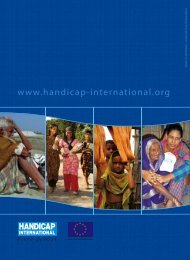Full page photo print - Harvard Law School Project on Disability
Full page photo print - Harvard Law School Project on Disability
Full page photo print - Harvard Law School Project on Disability
You also want an ePaper? Increase the reach of your titles
YUMPU automatically turns print PDFs into web optimized ePapers that Google loves.
PARenTs And fAMilies of childRen wiTh disAbiliTies<br />
Regardless of ethnicity, ec<strong>on</strong>omic status, or class, all parents are distressed when they learn<br />
that their child has a disability. The differences am<strong>on</strong>g them are very great, however, when you<br />
compare their beliefs and the resources and supports available to them. Traditi<strong>on</strong>ally, families,<br />
including grandparents and siblings, carry the resp<strong>on</strong>sibility for providing care to children with<br />
disabilities with little to no help from society. To effectively advocate for services, parents need<br />
to understand their rights and the rights of their child, as defined by CRC and CRPD.<br />
support for the family<br />
• Raise community Awareness: Dispel myth and stigma associated with disability.<br />
• Provide informati<strong>on</strong> and Resources: Build the knowledge and skills of family<br />
members, peers, and the community.<br />
• Provide Access to Rehabilitati<strong>on</strong> and habilitati<strong>on</strong>: Provide access to adequate<br />
medical care and equipment, as well as to support and services for children with<br />
disabilities.<br />
<strong>on</strong>e Parent’s story<br />
I am a parent of a disabled child. I am also a community worker with a good<br />
understanding of our early interventi<strong>on</strong> program.<br />
I felt great about this opportunity to increase awareness about disability (the START<br />
Program at the Sunshine Centre). I also wanted to help and support the parents<br />
of disabled children in this area. Often such parents do not trust people who have<br />
not had the same experiences. I know they can feel very isolated and ignored. I<br />
understand from my own experience that many of them do not get support from<br />
their families because there is no understanding of the needs of their disabled<br />
children.<br />
Many fathers of the disabled children do not give their support. My husband had<br />
great difficulty in accepting that our s<strong>on</strong> was disabled. I was not supposed to walk<br />
in the street with my child. His father could not believe that other people could see<br />
the beauty of this child. I struggled because he refused to give me any m<strong>on</strong>ey for<br />
the special food our child needed.<br />
I know how l<strong>on</strong>ely and frightened these parents can feel. I worried about who<br />
would be resp<strong>on</strong>sible for our child if something happened to me. I even believed it<br />
would be the best thing if my child died before me.<br />
I became a community worker because I saw how parents of disabled children<br />
really need support. I knew that with training, parents could help each other. They<br />
do not need people who feel ashamed of disabled children. They need to talk to<br />
some<strong>on</strong>e who can understand that even though the child is disabled, he is still a<br />
human being. He does not have a disease that can affect other people. 5<br />
5 Lloyd, G. “An Integrated, Specialized Educati<strong>on</strong>al Service Resp<strong>on</strong>ding to Local Need in Gauteng, South<br />
Africa.” 2000. Internati<strong>on</strong>al Special Educati<strong>on</strong> C<strong>on</strong>gress.<br />
http://www.isec2000.org.uk/abstracts/papers_l/lloyd_1.htm<br />
198 hUMAn RighTs. yes! AcTi<strong>on</strong> And AdvocAcy <strong>on</strong> The RighTs of PeRs<strong>on</strong>s wiTh disAbiliTies




